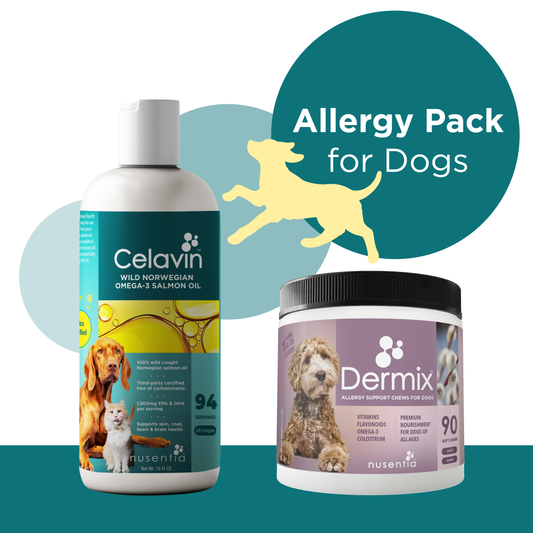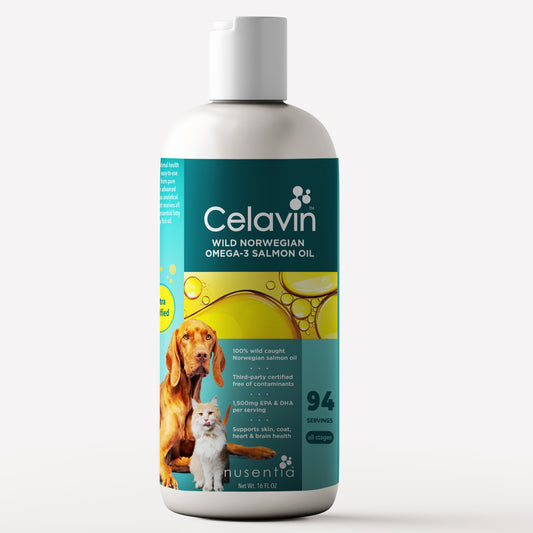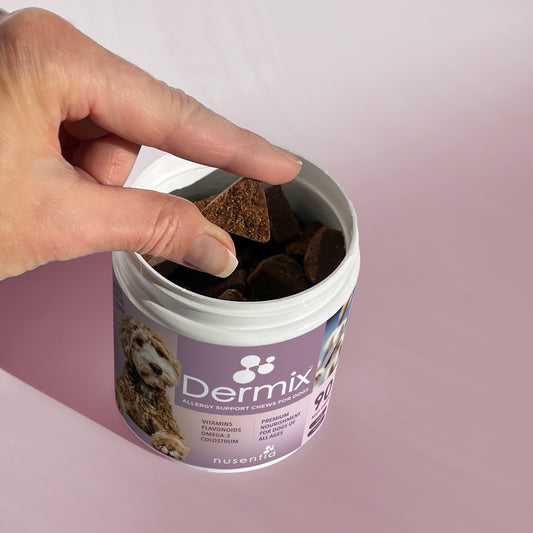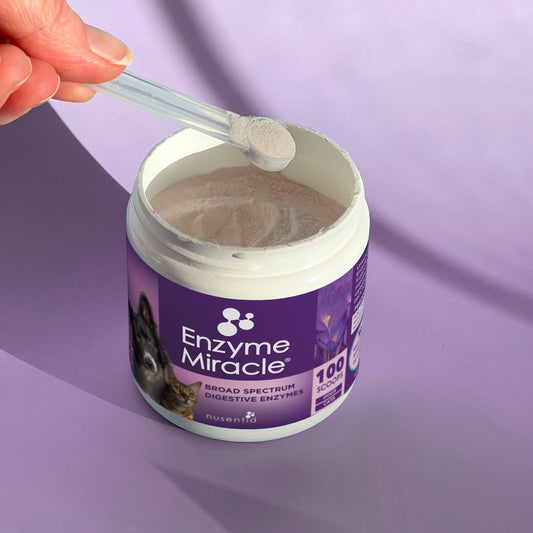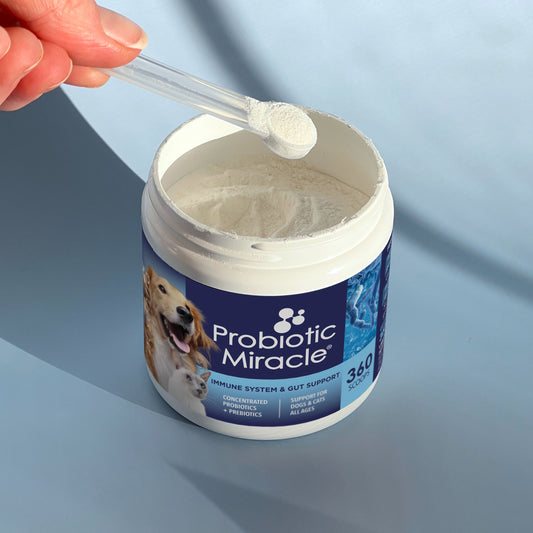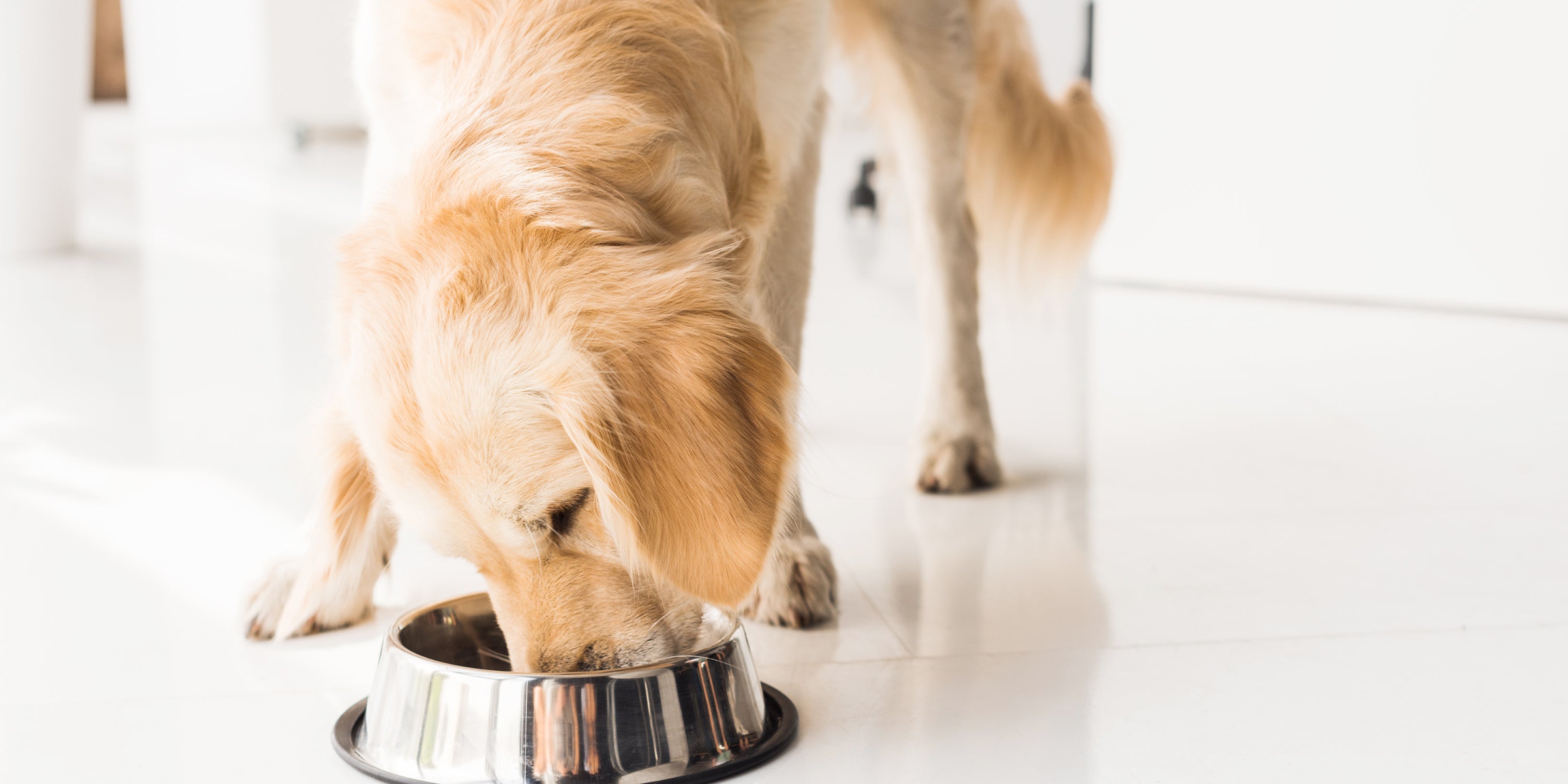
Tips for Allergies in Dogs
Welcome to our guide designed to support your pet's health naturally. Find a carefully curated selection of natural supplements below as well as tips to further assist you in managing Allergies in Dogs holistically.
-
Allergy Pack for Dogs
Regular price $49.21Regular priceUnit price / per$57.90Sale price $49.21Sale -
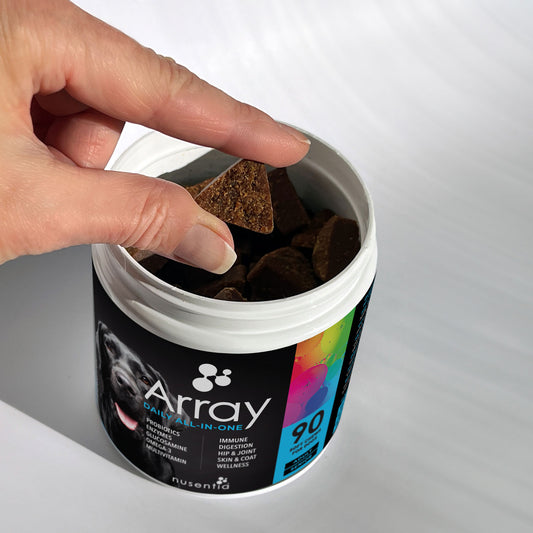 Sold out
Sold outArray Chews
Regular price $28.95Regular priceUnit price / per$34.95Sale price $28.95Sold out -
Celavin™ Salmon Oil
Regular price $24.95Regular priceUnit price / per -
Dermix™ for Dogs
Regular price $32.95Regular priceUnit price / per -
Enzyme Miracle®
Regular price From $23.95Regular priceUnit price / per -
Probiotic Miracle®
Regular price From $25.95Regular priceUnit price / per -
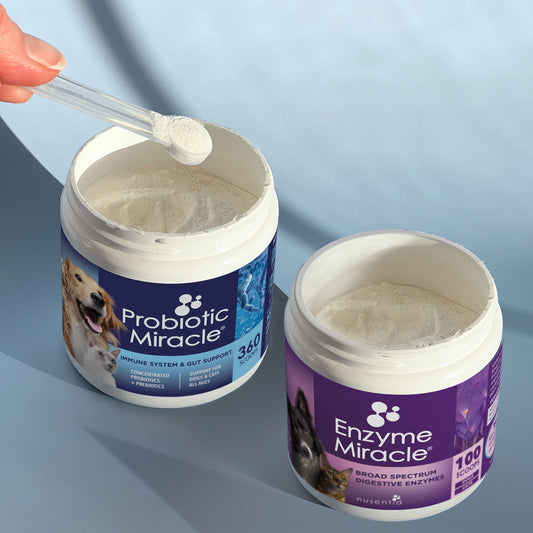 Sale
SaleThe Miracle Pack®
Regular price From $44.95Regular priceUnit price / per$49.95Sale price From $44.95Sale
Collection: Allergies in Dogs
"Help! What can I give my dog for allergies?!"
Nusentia® natural pet supplements have been helping dogs support the symptoms that come with allergies. When it comes to the best treatment for dogs with allergies, our products are manufactured with the highest quality ingredients for maximum absorption and efficacy.
Overview
Omega-3 fatty acids can help
Fish oil provides essential fatty acids which can help address the inflammation that accompanies allergies in dogs. Nusentia's® Celavin liquid is an ultra pure fish oil. Third party testing ensures quality and delivers more omega-3 than wild salmon oils without contaminants.
Support the gut with probiotics and enzymes
Enzymes and probiotics form a power duo to support your dog's immune and digestive systems. By streamlining digestion and nutrient absorption we may help improve symptoms of dogs with allergies.
Array Daily All-in-One offers omega-3 fish oil, probiotics, and enzymes in a convenient daily soft chew.
Feed a Raw and Grain Free Diet When Possible
Many dog foods for dogs with allergies will exclude grains and certain meats. Your dog's digestive system is not equipped to digest the complex proteins in grain. In time, the canine body will see those complex proteins as an enemy invader and counter with a negative inflammatory response. Eliminating grains and feeding raw animal protein when possible is a good idea for long term health.

What Are Allergies in Dogs?
An allergy is an unpleasant response to exposure to an inhalant, to a food, or to something in the environment (inhalant or skin contact). This response is triggered by the immune system. Dog allergies usually start between 1-3 years of age. Most common breeds affected are Golden Retrievers, Labrador Retrievers, Dalmatians, Poodles, English Setters, Irish Setters, Boxers, Bulldogs, Lhasa Apsos, Terriers, West Highland White Terriers, among others, although any dog may be affected.
Dog allergies fall into four categories.
4 Types of Allergies in Dogs
- Flea Allergy Dermatitis
-
Dog Food Allergies (and drug allergies):
The most common allergens are beef, dairy, wheat, egg, chicken, lamb, soy, pork, rabbit, and fish. -
Inhaled Allergies
Allergens such as grasses, molds, pollens, and dust mites. These circumstances can ebb and flow through the year, and there are tips for dogs during allergy seasons to help reduce symptoms. -
Direct Contact Allergies
Some dog allergies are caused by irritants through direct contact with the skin.
Other Causes of Allergic Dogs
Other potential root causes for dog allergies include genetic predisposition, environment, and antibiotics. Antibiotics administered at an early age may disrupt gut ecology and lead to allergic responses later in life.

Flea allergies and irritant allergies are usually more readily identified for the dog and treated by removal and control, but unfortunately is not the case with inhalant allergies and dog food allergies. There are things to look for to get a general sense of the problem and steps to take to improve your dog’s health.
Signs Your Dog Has Allergies
- Gastrointestinal problems
- Licking of the feet
- Excessive scratching
- Ear problems
- Sneezing
- Watery eyes
- Hair loss
As with many health ailments, allergies could include a number, but not all, of the signs above. It's important to consult with your veterinarian to rule out other underlying issues, such as kennel cough, which is a contagious and requires treatment.
Reducing Allergens and Symptoms
Your veterinarian may recommend a specialized diet tailored for dogs with allergies or prescribe antihistamines such as diphenhydramine to alleviate symptoms. Importantly, if you've pinpointed specific foods that trigger your dog's allergic reactions, it's crucial to eliminate these from their diet. This process involves removing the suspected allergen, monitoring your dog's response, and then possibly reintroducing the food. An improvement in your dog's allergies upon elimination and a worsening upon reintroduction strongly suggest the food is problematic.

With dog food it can be hard to distill down to the actual allergen as it may only be a particular ingredient, so you may want to look for options in dog foods that are designed for low allergy potential or consult with your veterinarian.
Here are some other steps to take nutritionally that will be sure to help:
Home Remedies for Dogs with Allergies
-
Vary the diet
It's beneficial to introduce variety into your dog's diet, particularly for puppies. If feasible, include raw meat, such as organs and muscle tissues, to provide a range of nutrients. -
Reduce Grains
Reduce or remove grains from the diet completely. -
Add Probiotics
Supplying probiotics, with a product like Probiotic Miracle® is an ideal home remedy to naturally bolster immune defenses. Supporting the gut with probiotics is especially beneficial for puppies in their first year of life when the gut is doing the most development. Creating a strong gut ecology may give your pup a better chance at avoiding allergies later in life. For dogs that already have allergies, regular use of probiotics over time should greatly help to abate the symptoms.
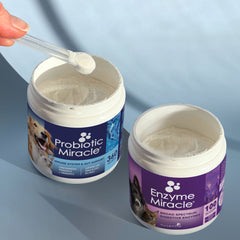
Probiotics and enzymes are an ideal way to naturally boost immune defenses.
Reducing Inhalant Allergies
Often these allergies in dogs are in response to those that are inhaled or absorbed through the skin (atopic dermatitis). Here are the following steps to take with your dog:
-
Treat Skin Problems
Reduce dog itching and scratching by treating the skin problems directly, removing the irritant. Also avoid excessive bathing. -
Improve Living Conditions
Try to improve your dog's living conditions to avoid the allergens (easier said then done). Keep his sleeping areas clean and dray. When your dog comes in from the outdoors, you can remove pollens by wiping down your dog's paws with a damp towel or cloth. -
Introduce Essential Fatty Acids
Dogs respond well to essential fatty acid formulas such as Celavin fish oil as they have been shown to reduce the severity of the inflammatory response. -
Provide Antioxidants
Multivitamins with antioxidant compounds as betacarotene, bioflavonoids, vitamins C and E, selenium, and zinc, which are needed to protect the body from the tremendous increase in free radicals that takes place during an inflammatory process.
Final Note
Often, allergies in dogs are misdiagnosed, and the real problem is simply a poor diet. Natural home remedy treatments including probiotics, vitamins, and making dietary changes can be a wise starting point and might also help your dog avoid unnecessary prescription drugs. However, it's important to always follow the advice of your veterinarian, as there may be an underlying health issue or diagnosis that needs attention.
To give your furry friend the relief and support they deserve, consider incorporating Nusentia® natural pet supplements into their daily routine. Our products, backed by quality testing and rich in essential nutrients, have already made a difference in the lives of many dogs with allergies. Don't let your dog suffer in silence. Explore our range of supplements today and take the first step towards a happier, healthier life for your pet.

